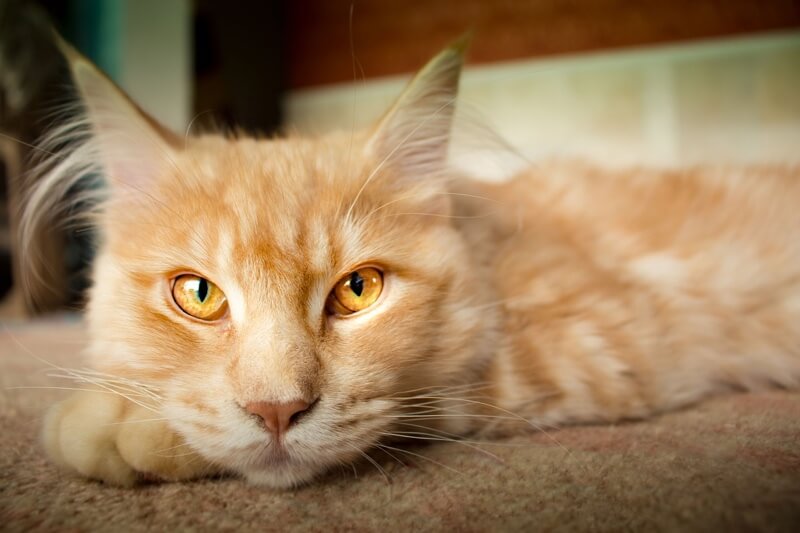Hypothyroidism in Dogs
Learn about the signs, causes, and treatment options for this common thyroid condition in dogs.
Cats are soft, cuddly, and terribly cute. However, if you parent one, you’re probably also familiar with the unpleasant experience of your li’l cutie retching or leaving surprise piles of kitty vomit on your carpet. Even healthy felines can be fairly frequent pukers. What causes cats to vomit, when should you be concerned, and what's the best way to clean up the mess?
Throwing up can be a regular occurrence for kitties, and often random vomiting is not a cause for concern. If your pal is throwing up more than once a week, or if they experience additional symptoms or behavioral changes, it’s a good idea to contact your veterinarian.
Understanding why your cat is vomiting can also help. There is such a wide range of reasons – everything from ingesting a poisonous substance to developing a serious condition like feline leukemia – that it can sometimes be hard to get to the bottom of things. Here are five of the most common triggers:
Does your cat vomit after eating? Some kitties eat too quickly and regurgitate their food. Regurgitation is actually different from vomiting in that the food does not have a chance to digest partially.
You can usually tell by looking at what your cat produced. If it’s firm, tubular, and covered in mucus, your pal has probably regurgitated. Cat vomit is liquid-like, and the food is more broken down. Your cat likely had a harder time expelling (you’ll notice the heaving and retching) if it was vomit.
Food allergies can cause vomiting, too. This could mean your kitty is allergic to their own food, or it could be a reaction to table scraps associated with allergies. Some common offenders include beef, fish, eggs, wheat, and milk. Speak with your veterinarian if you have dietary concerns.
Kitties are playful and curious, which can sometimes cause them to ingest items that aren’t meant for cats to swallow. This can include grass and plants, household items like paper clips and rubber bands, pieces of string or other toys, and just about anything else that is within reach and small enough.
In most cases, vomiting solves the problem, but in terms of potentially poisonous plants or sharp objects, it’s smart to follow up with your veterinarian.

Cats aren’t always the best at telling their pet parents when they feel under the weather. It’s helpful to remember that vomiting can be a symptom of many minor infections that can be treated fairly quickly.
Bladder infections, UTIs, upper respiratory infections, and inner ear infections are all common illnesses that can cause your kitty to puke. Uterine infections also cause tummy upset, but this condition is more prevalent in middle-aged and senior cats.
Gastrointestinal (GI) parasites can be found in as many as 45 percent of kitties and can affect cats of all ages. These include worm parasites such as roundworms, hookworms, and tapeworms, as well as single-celled organisms like Giardia.
Vomiting is a common symptom, and you may also want to watch for weight loss and anemia. In most cases, your veterinarian can prescribe medication to get rid of the parasite with just a few doses.
Unfortunately, there are also more serious disorders linked with vomiting. These can be metabolic conditions such as pancreatitis, kidney or liver failure, and hyperthyroidism, as well as chronic illnesses like inflammatory bowel disease. Vomiting can be a sign that your pal has cancer, while blood in the vomit can indicate an ulcer.
The most important takeaway is that while often cat puke isn’t cause for worry, sometimes it is. Get in the habit of routine wellness visits and always let your veterinarian know if your kitty vomits frequently or exhibits other symptoms.

Hairballs are akin to cat puke, and you can expect your kitty to expel one or two a week. They are long and thin (not ball-shaped at all!) and often covered in saliva and bile. Gross, but harmless.
Hairballs are the result of self-grooming. When your pal licks their fur, they swallow hair, dander, and dirt that occasionally accumulate into a hairball.
Just be aware that if a hairball gets stuck in your cat’s intestine, it can form a blockage. Contact your veterinarian if your kitty has a drop in energy and seems to be coughing and retching a lot without producing any hairballs or vomit.
Remember when we talked about stuff cats shouldn’t eat? That includes potentially poisonous substances, such as:
Depending on what your li’l buddy ate – and how much – ingesting poisons can be potentially life threatening. Some symptoms to be on the lookout for include:
Call your veterinarian or contact the ASPCA Animal Poison Control Center at (888) 426-4435 if you suspect your kitty ingested something poisonous.

Let’s get down to the dirty truth – cat puke can leave stains and odors in your carpets. You will want to act fast.
If you’re dealing with a particularly bad mess, you may need to bring in a professional carpet cleaner. There are also a lot of store-bought sprays and powders you can try. Look for an enzyme-based product that will help break down the proteins that cause permanent damage.
Here are some cleaning tips that use items you probably already own:
This recipe is quick and easy. You’ll need:
Simply dissolve the salt in the warm water and then add the remaining ingredients. Funnel into a spray bottle and shake well before using.
Help yourself focus on care and not cost during this process by getting a quote for cat health insurance today
If your feline friend throws up regularly, you and your veterinarian will need to investigate. Your pal could require blood work, fecal analysis, X-rays, ultrasounds, and even biopsies.
Depending on the diagnosis, your kitty could be facing anything from antibiotics to surgery. Help yourself focus on care and not cost during this process by getting a quote for cat health insurance today.
(opens new window)